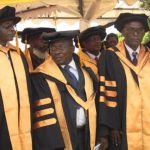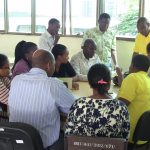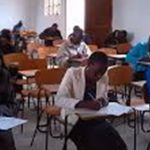Postgraduate Diploma in Education(PGDE)
The Postgraduate Diploma in Education course is designed to provide pedagogical knowledge and teaching skills to individuals with non education degrees or recognized advanced diplomas aspiring to get professional qualification in teaching
Programme Summary
Programmes Informations
A candidate aspiring for admission to the Postgraduate Diploma in Education Programme
should hold at least a Bachelor’s Degree or an Advanced Diploma from a recognized institution
A candidate doing Postgraduate Diploma in Education shall take a total of minimum 20 units and a maximum of 32 units. PGDE students are categorized into three groups/streams;
i. Stream A (20 units):
Applicants with two teaching subjects but lacking education courses to qualify them as professional teachers.
ii. Stream B (26 units):
Applicants with only one teaching subject. These applicants are supposed to take both education courses and some more 6 units of the subject that they are missing.
iii. Stream C (32 units):
Applicants without any teaching subject. They are supposed to take education courses (20 units) plus other 12 more units (6 from each teaching subject) to qualify as professional teachers.
Course | Course codes | Equivalent Code | Units | TCU CREDITS |
Introduction to Open and Distance Learning | OEA 501 | OEA 302 | 2 | 20 |
Introduction | OEP | OEP 309 | 2 | 20 |
Philosophy of Education | OEF | OEF 101 | 2 | 20 |
History and Sociological | OEF | OEF 102 | 2 | 20 |
Curriculum | OEI | OEI 101 | 2 | 20 |
Educational | OEM | OEM 201 | 2 | 20 |
Introduction | OEP | OEP 101 | 2 | 20 |
Independent | OEP | 2 | 20 | |
Teaching | OEI | OEI 208A | 1 | 10 |
Teaching | OEI | OEI 208B | 1 | 10 |
PLUS TWO of the following Teaching |
| |||
Chemistry teaching methods | OEI 530 | OEI 230 | 1 | 10 |
Physics | OEI 531 | OEI 231 | 1 | 10 |
Biology | OEI | OEI 232 | 1 | 10 |
History | OEI | OEI 234 | 1 | 10 |
Geography | OEI | OEI 235 | 1 | 10 |
Civics/ | OEI | OEI 237 | 1 | 10 |
English | OEI | OEI 238 | 1 | 10 |
Literature | OEI | OEI 239 | 1 | 10 |
Kiswahili | OEI | OEI 240 | 1 | 10 |
Business Studies Teaching Methods | OEI | OEI 241 | 1 | 10 |
Economics | OEI | OEI 242 | 1 | 10 |
Home | OEI | OEI 243 | 1 | 10 |
Mathematics | OEI | OEI 244 | 1 | 10 |
ICT Teaching Methods | OEI | OEI 245 | 1 | 10 |
TOTAL (Applicants | 20 | 200 | ||
TOTAL (Applicants | 26 | 260 | ||
TOTAL (Applicants | 32 | 320 | ||
1.1
General fees for the programme
S/N | ITEM | LOCAL | EAC/SADC (USD) | NON (USD) |
1 | Registration
| 30.000 | 30 | 30 |
2 | Examination (Test | 20,000 | 40 | 60 |
3 | Student | 20,000 | 20 | 20 |
4 | Student | 20,000 | 20 | 20 |
5 | Plagiarism fee | 20,000 | 20 | 20 |
6 | Quality | 20,000 | 20 | 40 |
1.2
Tuition fees per unit (or per 10 credits) for PGDE programme.
S/N | ITEM | LOCAL | EAC/SADC (USD) | NON (USD) |
1 | Theoretical | 60,000 | 40 | 80 |
2 | Theoretical | 90,000 | 60 | 120 |
3 | Teaching | 100,000 | 70 | 140 |
4 | Project/Independent | 100,000 | 70 | 140 |
| NAME | CONTACTS |
| Ms. Prisca Mbogo | Email: prisca.mbogo@out.ac.tz Mobile: +255752237500 |
Upon successful completion of the programme it is expected that a candidate shall have acquired the following competences;
- Knowledge:
Ability to;
- Relate philosophy with educational issues and analyse philosophy of education and teaching as a foundation of teaching profession.
- Analyse the various social and cross-cutting issues relating to education and its provision.
- Identify trends and practices in education across time and different regions or countries.
- Describe different methods of research used in education
- Demonstrate knowledge and an understanding on how to use a variety of teaching methods and techniques in his/her subject of specialization.
- Use different curriculum models and techniques in implementing curriculum and evaluating learners’ progress.
- Skills:
Ability to;
- Apply leadership skills and education management and administration principles in classroom management and managing schools.
- Apply research methods and procedures in solving education problems
- Construct authentic learning assessment instruments for assessing and measuring academic achievement of learners.
Translate educational psychology theories into pedagogical considerations including learners’ cognitive and behavioural development
THE PROGRAMME ASSESSMENT
Candidates will be evaluated by using the following criteria.
· Timed Test carrying 30%
· Final Examination carrying 70%
· Teaching Practice carrying 100%
· Independent study and report carrying 100%



